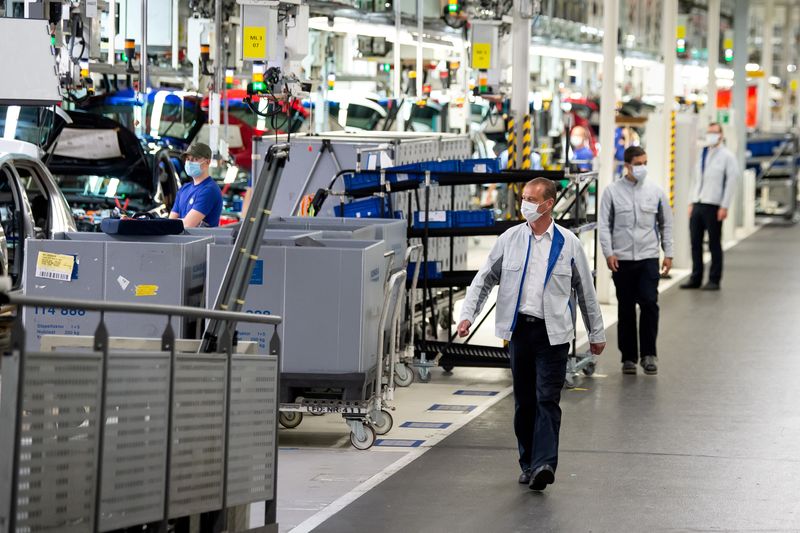German industrial output rises less than expected in April
2023.06.07 04:32

© Reuters. FILE PHOTO: Staff wear protective masks at the Volkswagen assembly line in Wolfsburg, Germany, April 27, 2020. Swen Pfoertner/Pool via REUTERS
By Maria Martinez
BERLIN (Reuters) -German industrial output rose less than expected in April, darkening the outlook for the euro zone’s largest economy following weak new orders data earlier this week.
Production increased by 0.3% on the previous month, the federal statistical office said on Wednesday. In a Reuters poll, analysts had pointed to an increase of 0.6%.
Activity in the construction sector increased 2% on the month and the manufacture of pharmaceutical products rose 6.4%, while the production of automotives dropped 0.8%.
The statistics office revised up the industrial production figure for March to a 2.1% decrease from a provisional figure of a 3.4% fall.
Even with this revision, German industrial production is 1.6% below its level a year earlier.
“Prospects for the rest of the year look poor,” said Andrew Kenningham, chief Europe economist.
The boost that German industry got from easing global supply problems and lower gas prices at the beginning of this year seems to be exhausted and output is likely to be increasingly constrained by weak demand as the backlog of work dwindles and new orders fall, Kenningham said.
Data on Tuesday showed industrial orders fell by 0.4% in the month of April.
April’s rise in output is better than some feared after the weak figures on new orders, as the order backlogs accumulated during the pandemic are still supporting production, Commerzbank (ETR:)’s senior economist Ralph Solveen said.
“However, without a pickup in demand, for which there are currently no indications, it is only a matter of time before companies start to scale back production,” Solveen said.
The HCOB final Purchasing Managers’ Index (PMI) for manufacturing showed that goods producers faced a sharp drop in new orders during May. Companies noted declining demand, particularly in exports to China, Europe and the United States.
“Without any significant pick up in activity, the German economy’s recession could continue in the second quarter,” ING’s global head of macro Carsten Brzeski said.







